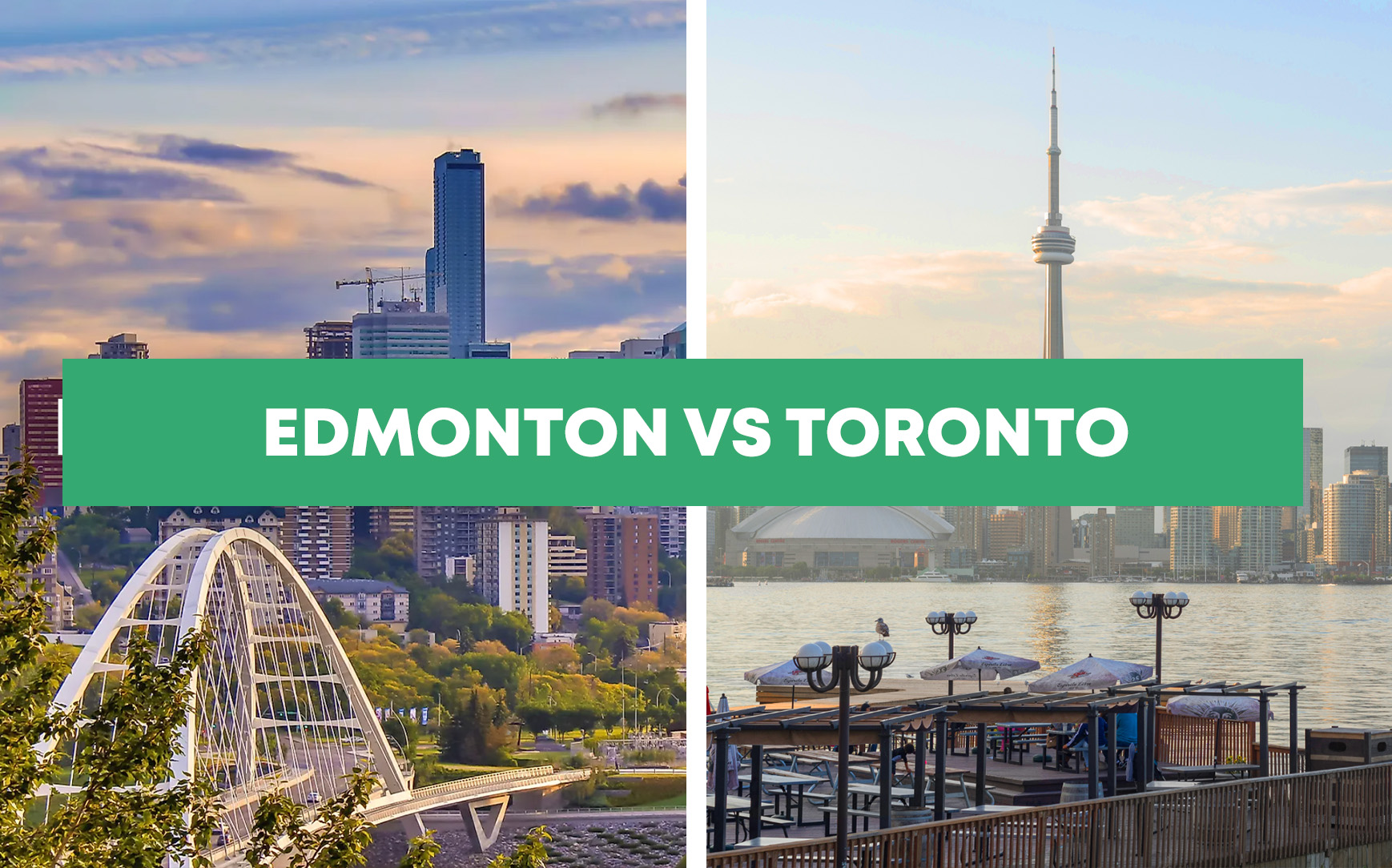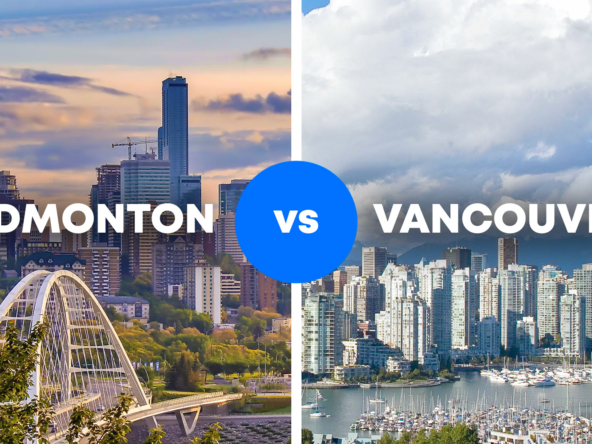Introduction: Understanding the Cost of Living in Canadian Cities
When considering a move to a new city, the cost of living is often a decisive factor. In Canada, the contrast between different cities can be stark, particularly when comparing major urban centers like Edmonton vs Toronto. This article aims to provide a detailed comparison of the cost of living in these two cities, helping you make an informed decision whether you’re moving for work, lifestyle changes, or new opportunities.
Edmonton, the capital of Alberta, is known for its vibrant cultural scene and bustling job market, particularly in sectors like energy, technology, and education. Meanwhile, Toronto, as Canada’s largest city, offers a diverse array of industries, a dynamic cultural landscape, and a wide range of lifestyle options. However, these opportunities come with varying living costs, which we will explore in this article. From housing affordability to daily expenses, and from transportation costs to job opportunities, this comparison covers all the essential aspects that affect daily life in Edmonton vs Toronto.
As we delve into the specifics of each city, remember that your personal preferences and lifestyle choices play a significant role in determining the right fit for you. So, let’s start by comparing the most significant aspect of any cost of living analysis: housing affordability.
Housing Affordability: Edmonton vs Toronto
Edmonton Housing Market
- The average home price in Edmonton was $380,827 in November 2023, showing a 3.3% increase year-over-year.
- The average sale price slightly decreased from $418,713 in 2022 to $400,827 in 2023, indicating some fluctuations.
- Single-family home prices are expected to rise by 2-3%, reaching around $491,436 in 2023.
Toronto Housing Market
- In the Greater Toronto Area, the average home sold for $1,082,179 in November 2023, a slight 0.3% increase over the previous year.
- The average price for a home in the GTA in 2023 was approximately $1,134,781.
- There’s an anticipated decrease in average home prices to about $1,061,853.91, marking an 11.8% decline.
The stark contrast in housing prices between Edmonton vs Toronto is evident, with Toronto’s average prices being significantly higher. This difference can be a major factor for those considering a move, particularly for those looking for affordable housing options.
Daily Expenses: Groceries, Utilities, and More
Groceries and Everyday Expenses in Edmonton
- Basic lunch in the business district: C$24.
- Regular fast-food meal: C$13.
- Basic grocery items like chicken, milk, and eggs range from C$2.77 to C$8.
Groceries and Everyday Expenses in Toronto
- Basic lunch in the business district: C$30.
- Regular fast-food meal: C$13, similar to Edmonton.
- Basic grocery items such as chicken, milk, and eggs range from C$4.08 to C$9, generally higher than in Edmonton.
Utility and Housing Costs
- In Edmonton, monthly rent for a 900 sqft furnished apartment in an expensive area averages C$2,118, while in a normal area, it’s around C$1,610. Utilities for two people in an 85m2 flat average C$319.
- In Toronto, the same size apartment in an expensive area costs about C$3,578 per month, with utilities for two people averaging C$180.
The cost of groceries and utilities in Toronto is generally higher than in Edmonton, reflecting the overall higher cost of living in Toronto. This can significantly impact monthly budgets, especially for those with fixed or limited incomes.
Cost of Living Analysis: Edmonton vs Toronto
Transportation Costs in Edmonton vs Toronto
Transportation in Edmonton
- Public transport monthly ticket: C$101.
- Average cost for a new Volkswagen Golf: C$29,563.
- Gasoline price per liter: C$1.37.
Transportation in Toronto
- Public transport monthly ticket: C$148, notably higher than in Edmonton.
- Cost for a new Volkswagen Golf: C$36,713, more expensive than in Edmonton.
- Gasoline price per liter: C$1.62, also higher than in Edmonton.
Transportation costs in Toronto are higher across the board compared to Edmonton. This includes the costs of public transport, purchasing a vehicle, and fuel prices. For those reliant on public transportation or driving, this difference can be a crucial factor in their overall living expenses.
Job Market and Employment Opportunities
Edmonton Job Market
- As of November 2023, Edmonton’s unemployment rate stood at 6.2%, a slight increase from the previous month, but significantly lower than its peak in June 2020.
- There was a reduction in full-time jobs but an increase in part-time positions, resulting in a net increase of 1,200 jobs in November 2023.
- The city showed growth in full-time jobs in various sectors including natural resources, utilities, construction, trade services, the financial sector, business & building services, and public administration.
- Edmonton’s innovation ecosystem, particularly in startups, has grown tremendously, with sectors like AI, machine learning, big data and analytics, and life sciences being prominent. The city is increasingly recognized for its affordable tech talent and is becoming a hub for innovation and technology.
Toronto Job Market
- The unemployment rate in Toronto was 6.6% in November 2023, slightly higher than Edmonton’s, but still below the long-run average.
- Similar to Edmonton, there was a decrease in full-time employment but an increase in part-time jobs.
- Key industries in Toronto include advanced manufacturing, artificial intelligence, cleantech, digital media & gaming, e-mobility, film & TV, financial services, food and beverage, hardware, life sciences, and technology. Toronto is known as the third largest tech center in North America, highlighting its role as a major hub for business and innovation.
Both cities offer diverse job markets, but with distinct focuses. Edmonton’s growth in the tech and innovation sectors, especially in startups, contrasts with Toronto’s established status as a hub for a variety of industries, including technology, finance, and media. These differences can influence job seekers based on their industry preference and career goals.
Lifestyle and Cultural Differences
Edmonton’s Lifestyle and Culture
- Edmonton is celebrated as “Canada’s Festival City,” renowned for its vibrant festival culture. Throughout the year, the city hosts a variety of legendary events, encompassing music, arts & culture, and culinary celebrations. These festivals contribute to making Edmonton an exciting and dynamic place to live and visit.
- The city’s growing innovation ecosystem, particularly in the tech and startup sectors, adds a modern and progressive layer to its cultural fabric. This aspect attracts a diverse and creative community, contributing to the city’s lively atmosphere.
- Edmonton’s community focus and smaller city feel, combined with these cultural offerings, make it a unique place to live, offering a blend of traditional and contemporary experiences.
Toronto’s Lifestyle and Culture
- Toronto’s cultural scene is rich and diverse, featuring world-class museums, galleries, and theatre productions. This vibrant tapestry of cultural experiences caters to a wide range of interests and is a significant part of the city’s allure.
- The Royal Ontario Museum (ROM), Canada’s largest museum, is a central cultural landmark in Toronto, offering extensive exhibits on art, culture, and natural history. Its collection of over six million items makes it a must-visit for residents and tourists alike.
- Art lovers can immerse themselves in the Art Gallery of Ontario (AGO), which showcases a remarkable collection of artworks from various eras and regions, including pieces by famous artists like Monet, Van Gogh, and Picasso.
- The Distillery District and the Power Plant Contemporary Art Gallery are other notable cultural highlights. The Distillery District, a beautifully preserved 19th-century industrial complex, is now a hub for art galleries, while the Power Plant Gallery focuses on contemporary art from around the world.
- Toronto’s theatre scene is also vibrant, with iconic venues like the Princess of Wales Theatre and the Soulpepper Theatre Company, known for their world-class productions and diverse range of theatrical works.
The lifestyle and cultural differences between Edmonton vs Toronto are distinct and diverse. While Edmonton offers a blend of traditional and contemporary cultural experiences with a community focus, Toronto stands out for its rich array of world-class museums, galleries, and theatres, reflecting its status as a major cultural hub in Canada.
Conclusion: Making an Informed Decision
When choosing between Edmonton vs Toronto, it’s crucial to consider the distinct differences in cost of living, job opportunities, and cultural experiences each city offers. Edmonton presents a more affordable housing market, a growing job sector in tech and innovation, and a vibrant festival culture. Toronto, on the other hand, boasts a diverse job market with opportunities in various industries, a rich cultural scene with world-class museums and theaters, and a dynamic urban lifestyle, albeit at a higher cost of living.
Ultimately, the decision depends on individual priorities and preferences. Whether it’s the affordability and community spirit of Edmonton or the cultural richness and diverse job market of Toronto, both cities offer unique advantages. This comparison should provide a clearer picture, helping you make an informed choice that aligns with your lifestyle, career goals, and financial considerations.
Q: How do the costs of living in Edmonton vs Toronto compare?
A: The cost of living in Edmonton is generally lower than in Toronto. Housing, groceries, and other expenses are typically more affordable in Edmonton vs Toronto.
Q: What are the average monthly housing costs in Edmonton?
A: The average monthly housing costs in Edmonton can range from $800 to $1500 for a one-bedroom apartment, depending on the neighborhood and amenities.
Q: Is it cheaper to live in Edmonton vs Toronto?
A: Yes, living in Edmonton is generally cheaper than living in Toronto in terms of housing, groceries, and other essential expenses.
Q: How does the public transit in Edmonton vs Toronto compare?
A: The public transit in Toronto is more extensive and widely used compared to Edmonton. However, the cost of public transit in Edmonton is generally lower than in Toronto.
Q: What are the job opportunities like in Edmonton vs Toronto?
A: Edmonton offers various job opportunities, particularly in the oil and gas industry, while Toronto has a more diverse job market with opportunities in finance, technology, and other sectors.
Q: What should I know before moving from Toronto to Edmonton?
A: Before moving from Toronto to Edmonton, it’s essential to research the cost of housing, weather conditions, job opportunities, and the overall lifestyle differences between the two cities.
Q: How does the cost of rent in Edmonton compare to Toronto?
A: The cost of rent in Edmonton is generally lower than in Toronto. Rent for a similar-sized apartment or house is more affordable in Edmonton compared to Toronto.
Q: What are some key factors to consider when moving to Edmonton from Toronto?
A: When moving to Edmonton from Toronto, it’s important to consider the cost of living, climate differences, job opportunities, transportation options, and the overall lifestyle change.
Q: Is living in Edmonton, Alberta, more affordable than living in Montreal, Quebec?
A: Yes, living in Edmonton is generally more affordable than living in Montreal, particularly in terms of housing and overall cost of living.
Q: How does the real estate market in Edmonton compare to Toronto?
A: The real estate market in Edmonton generally offers more affordable options compared to Toronto. Housing prices and property values are often lower in Edmonton than in Toronto.




